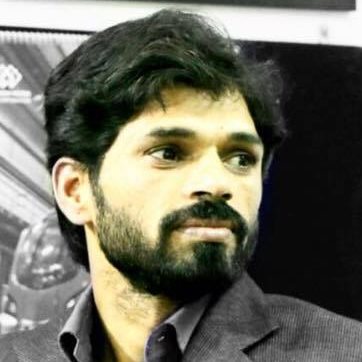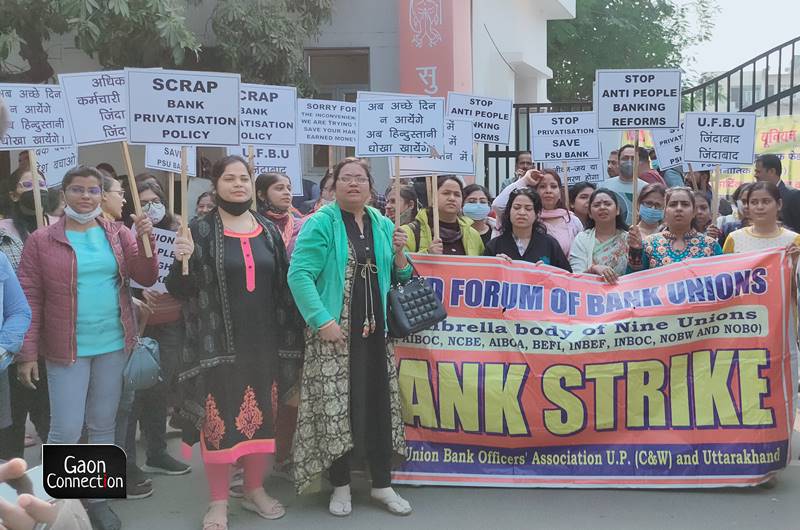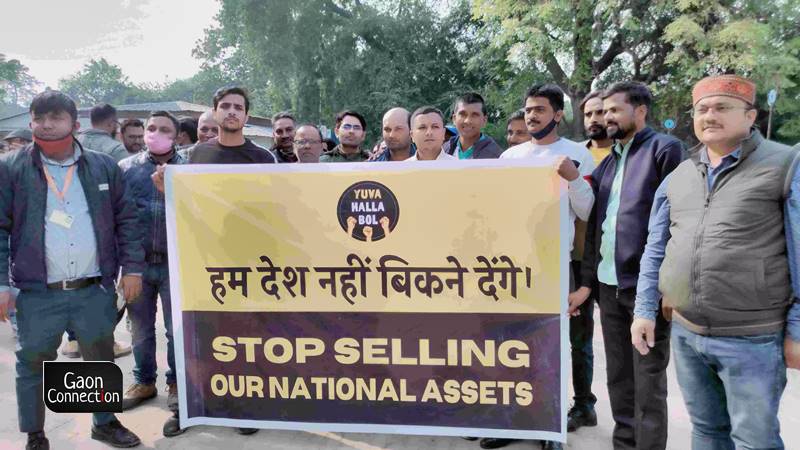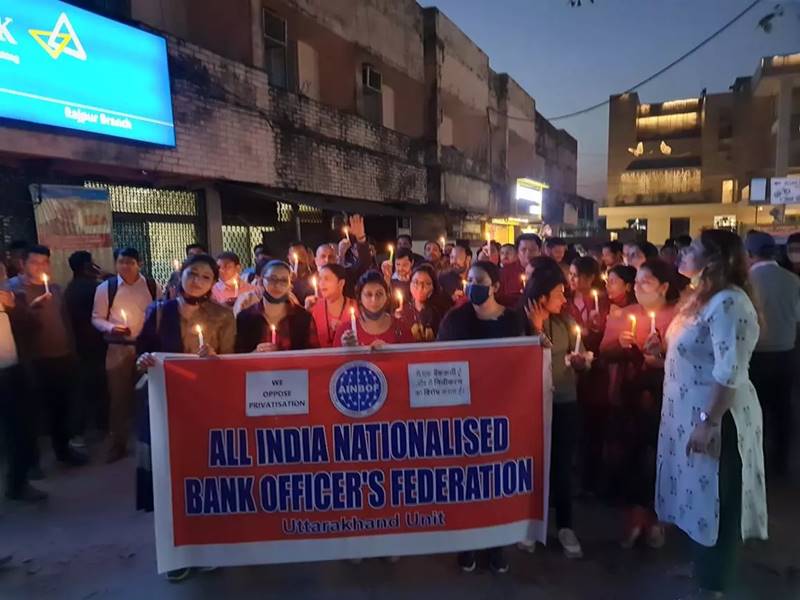Bank Strike: “We will not allow public sector banks to be sold to private bidders”
Striking bankers across the country protest the privatisation of public sector banks and threaten to intensify their stir if the Indian government does not reconsider its plan. Government banks serve the poor, they have a responsibility towards society and these banks should not be sold to private operators, say the striking employees.

Lucknow, Uttar Pradesh
Threatening to extend their two-day hartal on December 16 and 17 into an indefinite strike, about a million public sector bank employees across the country protested the privatisation of two public sector banks. The United Forum of Bank Union, an umbrella body of bank unions across the country, went on strike with placards carrying slogans protesting the privatisation.
“The reports about the first day of the strike yesterday have been heartening,” Sandeep Akhauri, joint secretary, All India Allahabad Bank, told Gaon Connection. “In the past ten years this has been the 43rd hartal of bank employees. But this time it is not about our salaries or perquisites. We are only trying to protect the national institutions from being taken over by the capitalists,” Mumbai-based Akhauri added.
“Government banks serve the poor, they have a responsibility towards society and these banks should not be sold to private operators,” the bank official stated emphatically.

Also Read: Explained: Why are a million public sector bank employees on a two-day strike?
On December 16, while finance minister Nirmala Sitharaman was holding talks with experts from the financial sector on the forthcoming Budget 2022-23, bankers across the country were striking work. They are protesting against the Indian government’s plan to privatise public sector banks.
The matter of privatisation was first brought up during the budget session of 2021-22, when the finance minister had spoken of privatising two national banks, along with some other institutions.
According to the protesting bankers, the matter did not go forward as the farmers’ agitation against the three farm laws took centrestage. The government is approaching the matter with caution now but the protestors fear it will not be long before amendments will be brought about to ease the bank privatisation.
Not just bank employees, but even other organisations have also supported the cause, said Pawan Kumar, senior vice-president, All India Bank Officers Federation, told Gaon Connection. He spoke after a demonstration outside the State Bank of India’s head office in Lucknow, Uttar Pradesh. “The show of support shows how much opposition there is to privatisation,” he said.
“We have planned a two-day protest. If nothing comes of it, we will strike indefinitely. The hartal will spill onto the streets,” Pawan Kumar warned. He said if it came down to the ropes, they would even go door to door urging people not to vote for a government that is selling their banks to the private operators.
“The general public has entrusted 157 crore rupees to government banks. The private operators are eyeing this money,” the senior vice-president asserted. “Many private banks in the country have started and closed down. But government banks have continued to serve and honour the people. They have trusted us and we will not let them down,” the official continued. “Even if it means we have to change the government,” he said.
Also Read: ‘No vaccination, no sanitisation— yet, we bank employees are called Corona warriors’
There are fears that in the Winter Session of parliament, the government planned to bring about changes in the labour laws, said Vikram Saxena, employee at the Union Bank. “The government will make changes to the law in such a way that when it privatises the banks, there will be nothing to stop it from doing so,” Saxena said.

“The government has spoken of privatising two banks. Which ones are these,” he demanded to know. “It could be the bank I am working in. When banks were privatised in 1969, bankers had fought a long battle. There were 27 banks, but only 12 remain after the mergers, and even those are being privatised,” Saxena pointed out to Gaon Connection.
“We are non-political, but if the government does not pay heed to us, we will go door to door telling voters the dangers of privatisation of banks. We will do it in Uttar Pradesh, Punjab and Maharashtra,” he warned.
According to Akhauri, the United Forum of Bank Union was in talks with the government for two whole days. “But the Union has been offered no written assurance that there will be no reforms or amendments to banking bills, passed in this session of Parliament. So, we had no other option but to declare a hartal,” Akhauri explained.
“We have the support of the Reserve Bank of India, National Bank for Agriculture and Rural Development, the All Teachers/Employees Welfare Association, Uttar Pradesh (ATEWA), all four central trade unions and the farmers unions. We will see this battle through,” Pawan Kumar of All India Bank Officers Federation, said.

The first day of the hartal was a success, said BP Singh, secretary, All India Rural Bank Officers Federation. “The farmers and labourers from the rural areas that we serve, are with us in our protest,” he told Gaon Connection.
One of the biggest drawbacks of privatisation is that it is not possible to open a zero-balance account, said Anand Kumar, general secretary, Aryavart Gramin Bank Officers Association, told Gaon Connection. “When banks were nationalised, it was decided that bank facilities would reach even the remotest villages in the country. We open bank accounts with hundred rupees or even with zero balance. Private banks won’t do so. They require a balance of at least five thousand rupees,” the general secretary pointed out. “We offer easy loans to so many people. These will stop if the banks are privatised,” he added.
“This is a battle for the country, for its economy,” Neelam Upadhyay, employee at a branch of the State Bank of India in Lucknow, told Gaon Connection. “We studied so much, gave exams to join banks. More than 20 lakh people apply for positions in the bank of which only upto 200 people are selected. We have proved our capability and are selected accordingly,” Upadhyay said.
“We know only too well how private banks recruit their employees. The government wants that only such people be employed who will do its bidding, and won’t oppose any of its dubious moves. This will facilitate the government to do as it wants without any opposition,” she said.
Read the story in Hindi

